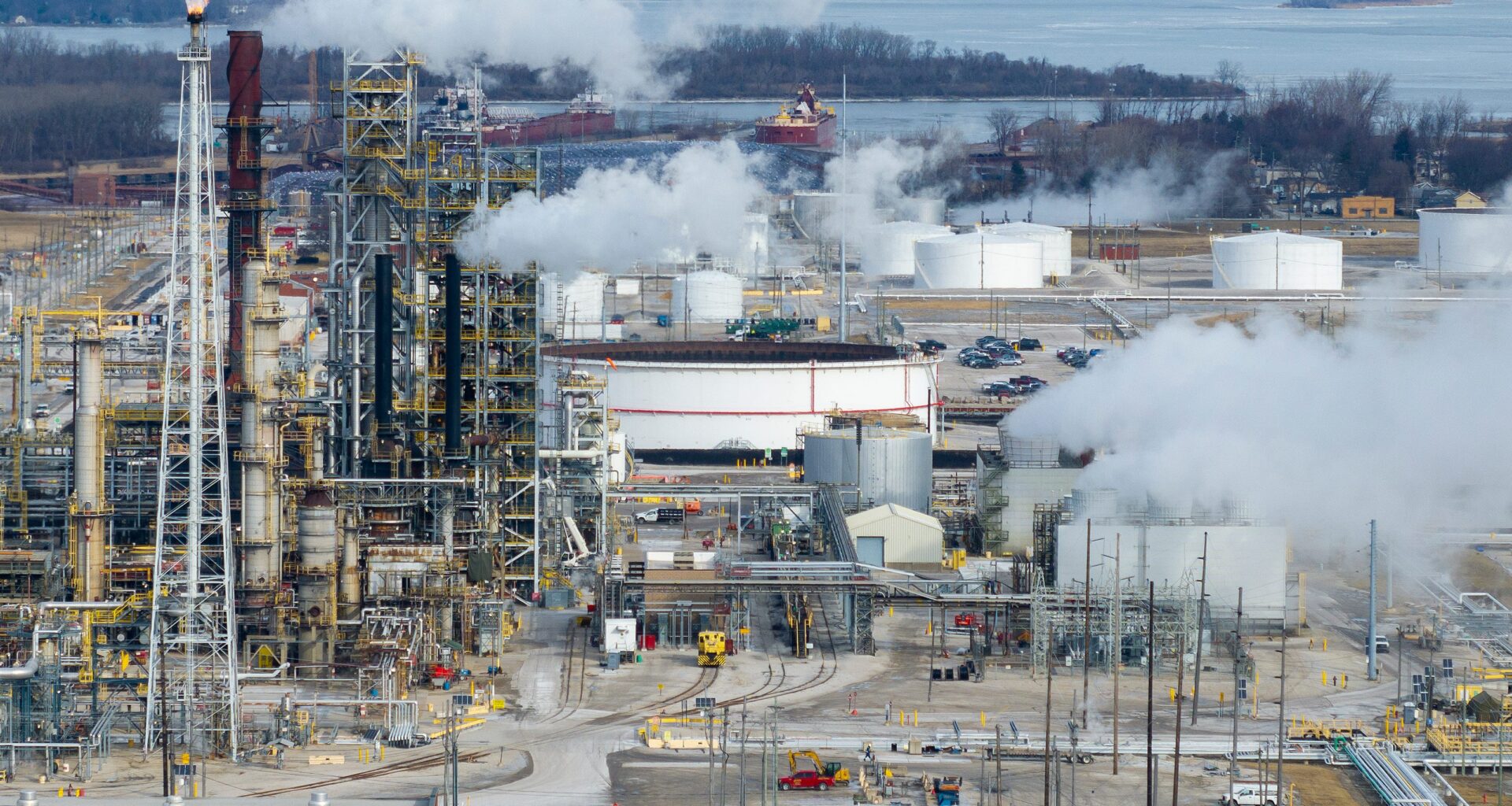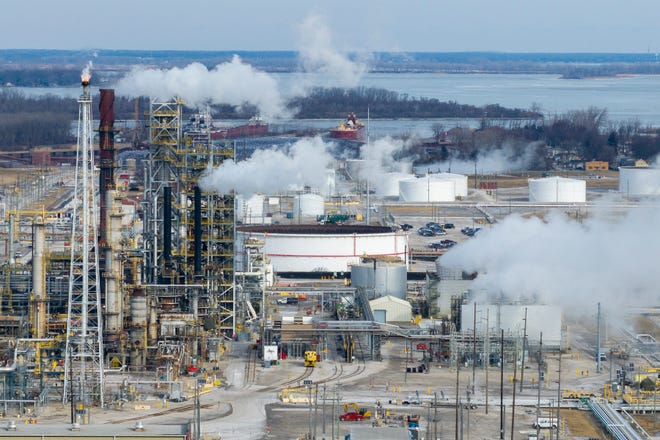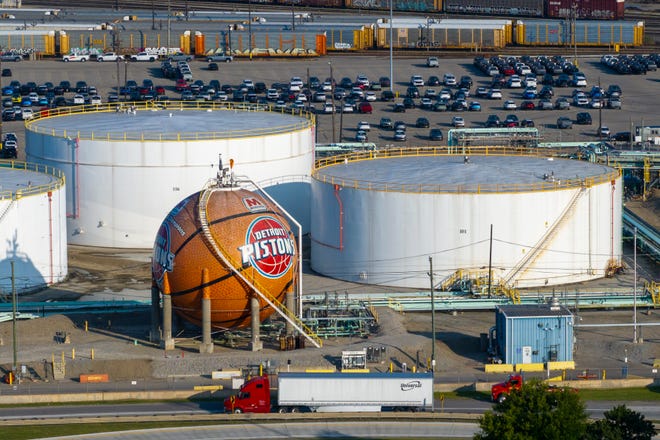President Donald Trump’s pronouncement that the U.S. has “unlimited energy” and doesn’t need Canada’s natural resources brushes over the reality that experts said much of rural Michigan that elected him does, in fact, need Canada to keep warm in the winter.
“We don’t need anything they have,” Trump said Feb. 3 of Canada’s resources on his Truth Social platform.
Except for the million-plus Michiganians living in Trump Country.
Outside of the cities and suburbs, Michigan’s rural residents largely heat their homes with propane gas that’s stored in a backyard tank known as a “pig.” That propane is delivered to homes by truck, which runs on fuel that, more often than not, originates from Canadian oil.
The majority of Michigan’s propane supply comes from Canada. And energy industry analysts said propane costs would increase overnight if that supply were disrupted in a trade war.
Likewise, oil refineries in the Upper Midwest are largely geared toward refining crude oil from western Canada that flows into the country through multiple pipelines, underscoring Michigan’s dependency on our neighbors to the north.
Trump’s notion that these refineries can switch from using heavy crude from Alberta’s oil sands region to Texas black gold “shows a lack of understanding” of how fuel gets to gas stations in Michigan, said Jeff Petrash, an energy industry consultant.
“It’s not like your thermostat — oh, turn it up and down,” said Petrash, a former general counsel of the National Propane Gas Association. “The complications would be huge.”
This heavy reliance on Canadian oil includes the Marathon Petroleum Corp. refinery in Detroit as well as the PBF Energy Inc. and Cenovus Energy Inc. oil refineries in Toledo that supply unleaded gas, diesel and jet fuel to Michigan (both Toledo refineries account for 43% of Michigan’s motor fuel supply, PBF Energy has said).
In a statement to The Detroit News, Cenovus opposed Trump’s planned 10% tariff on Canadian energy imports that the president put on hold for 30 days after Canadian leaders pledged to beef up border security in the hunt for small amounts of the deadly drug fentanyl found smuggled across the northern border each year.
“Refiners, such as the Cenovus Toledo Refinery, benefit from access to cheaper Canadian crude oil feedstock, as do many other refineries in the U.S. Midwest, ensuring the delivery of reliable and affordable energy products to consumers in the region. Many analysts predict the tariffs could lead to an increase in the price of gasoline, particularly in the Midwest,” the Calgary, Alberta-based petroleum company said in the statement.
Light crude oil, like the kind that comes out of the wells in Texas, can be used at the Toledo refinery as “an inefficient substitute,” Cenovus said.
“Certain units in the refinery would not be run or would not be able to run at peak rates, meaning they could not produce the same supplies of jet fuel, gasoline and diesel that they do today, and this would likely impact price,” the company said.
PBF Energy also confirmed it relies on Canadian crude to operate its Toledo refinery. “As such, we need the specific types of raw materials — in this case, crude oil — that may not be accessible here in the U.S.,” the New Jersey company said in a statement.
Findlay, Ohio-based Marathon Petroleum declined to comment on the source of the southwest Detroit refinery’s oil. But in the past, company officials have acknowledged the plant is fed, in part, by Canadian oil pipelines carrying heavy crude. The Marathon refinery’s giant pet coke piles — long a source of environmental concerns in southwest Detroit — are a byproduct from refining heavy crude from Canada’s oil sands region.
Some Canadian leaders in recent weeks have talked about using their country’s energy resources as leverage in a trade war with Trump. They could simply turn off the flow of propane gas or crude oil, an extraordinary tactic that’s been used in real wars involving bombs and bullets (see: Ukraine and Russia).
“That would be a worst-case scenario where the Canadians stop exports,” Petrash said.
Complicating matters is that most of the propane Michigan imports from Canada flows as unrefined natural gas liquids along Enbridge Energy’s Line 5 pipeline through both of Michigan’s peninsulas. Line 5 also supplies light sweet crude oil to the PBF Energy refinery in Toledo.
Natural gas liquids flow east on pipelines from Alberta through Wisconsin and Michigan to the St. Clair River and across the border into Sarnia, Ontario, where they are fractionated — the process of separating hydrocarbons into propane, butane and ethane. From there, the propane is piped back across the river and stored in large underground reserves in Marysville, a major terminal for propane retailers in Michigan.
More:Livengood: Canadian leader on a mission to convince U.S. governors ‘we’re your BFF’
Michigan No. 1 in propane use
While Line 5 is hugely controversial to Michigan residents concerned about a leak into the Great Lakes, the pipeline is a lifeline for rural residents in areas that predominantly voted for Trump in last year’s election.
Attorney General Dana Nessel, who is on a mission to shut down Line 5 in court, and allies have argued a closure would not affect fuel supplies much. But experts and industry officials said there’s not an easy alternative to propane for heating homes across the Upper and Lower peninsulas.
Enbridge is a Canadian company that owns a pipeline running through Michigan that supplies petroleum products to both Canadian and Upper Midwest refineries.
That’s a lot of power to dictate the price of energy in Michigan that rests in the hands of the Canadians.
“There’s no easier way to control (energy) than to turn off the spigot on Line 5,” said Chris Caywood, co-owner of Caywood Propane Gas LLC in Hudson, which has operations across south-central Michigan.
“And if that were to happen,” Caywood added, “there would be an immediate impact on both price and the availability of propane in the state of Michigan.”
Michigan is the nation’s No. 1 consumer of propane for residential purposes for heating homes, hot water and clothes dryers and No. 2 in overall propane use (531 million gallons) behind California (539 million), a state with almost three times as many residents. Michigan uses nearly as much propane as Indiana, Kentucky and Tennessee combined (535 million gallons).
Michiganians with a pig consume 356 million gallons of propane annually, 55% of which comes from Canada, according to propane industry data.
The amount of propane from small cylinder tanks used to grill steaks in Michigan is minuscule (about 2%) compared to our reliance on it to heat homes.
For residential use, Michigan is followed by Wisconsin (325 million gallons of propane) and Minnesota (320 million). Iowa, Ohio and Missouri — three major corn-growing states with expansive rural populations that voted for Trump — consume between 208 million and 283 million gallons of propane each year. Propane is the primary heating source for drying field corn, making Michigan and those aforementioned Midwest agricultural states heavily dependent on the gas.
If Canada were to cut off propane exports in a trade war with Trump, Caywood said, it would cause propane prices across the country to spike, similar to what happened in the winter of 2014 when then-Gov. Rick Snyder had to declare an energy emergency because there was a propane gas and heating oil shortage.
“When propane is short, that’s a big, big deal,” Caywood said.
More:Trump creates council for ‘energy dominance,’ boosts offshore drilling
Michigan’s ‘huge’ propane dependence
Those of us with natural gas — the type that is piped into homes in populous areas — take for granted that this is not available in rural areas. There are more than 550,000 homes in Michigan that rely on propane gas for heating and cooking, according to the Propane Education & Research Council.
There are as many as 1.3 million residents in Michigan living on propane gas, based on the Census Bureau’s average of 2.43 residents per household in this state. There are more than 51,000 additional commercial, industrial and agricultural propane customers, according to industry data.
“It’s huge,” Petrash said of Michigan’s reliance on propane for residential heating.
The Upper Peninsula, rock-ribbed Trump Country, especially depends on Canadian propane, getting 65% of its LP from Line 5 alone, according to Enbridge. But while the Line 5 debate always focuses on the U.P., 95% of Michigan’s propane consumption is in the much more populous Lower Peninsula, according to industry data.
There are way more propane voters living below the bridge.
Supply-related cost increases in propane hit rural Michigan customers harder, Petrash said, because of the added cost of transporting propane supplies from domestic sources in Texas and other parts of the country.
The alternative to propane gas in rural Michigan for heat is burning wood, fuel oil, a geothermal heat pump, or a stove or furnace that burns wood pellets or corn (which has to be dried to a certain moisture content using propane-burning dryers).
Propane is a volatile gas and can’t be put through residential pipelines. While the discovery and extraction of large natural gas deposits in Pennsylvania’s Marcellus Shale formation has been a boon for U.S. energy independence, there are economic and infrastructure limitations to connecting every home in a large state like Michigan to a residential pipeline system.
“If you don’t have natural gas services today, you’re probably never going to get it,” Petrash said.
All of this is to say there’s no easy way out of Canada’s grip on our way of life in rural Michigan, which overwhelmingly voted for Trump in the last three elections.
Petrash suspects Trump’s new energy secretary, Chris Wright, a former fracking industry executive and oil patch guy, understands the conflicting reality with Trump’s misplaced belief that America doesn’t need anything Canada’s got.
“A truly ‘America First’ nation would say, ‘Oh, why do we want to help out the Canadians?’ The fact that it drops off a giant amount of propane that the people of Michigan consume matters hugely,” Petrash said.
An open U.S. Senate seat in Michigan next year, Petrash said, “makes the politics complicated” for Republicans as Trump tries to confront America’s mostly energy-driven trade deficit with Canada.
“Does the White House want to imperil that (Senate seat) by making people freeze?” Petrash asked. “I don’t think so.”
clivengood@detroitnews.com


